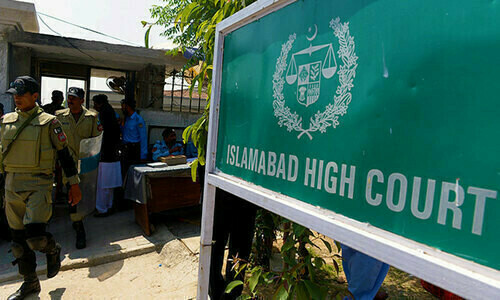LAHORE: The maiden Lahore Literary Festival (LLF) last year came about as a refreshing event to which rain added a thrill of its own. The feel and atmosphere lingered this time round as the Alhamra Art Centre was colourfully decorated up – a perfect setting for discussing literature, arts and a wide range of other subjects.
Lahore, Literature and Longing, one of the sessions on the opening day of the LLF 2014 on Friday, was much more than that. The presence of Pran Nevile, Aitzaz Ahsan, Khaled Ahmed and Fakir S. Aijazuddin as panellists added glitter to the recollections about Lahore of yore and its significance as a centre of knowledge and culture.
Majid Sheikh moderated the discussion and shared with the audience a brief history of Lahore. Pran Nevile narrated how the childhood images of Lahore were etched in his mind as those were the days of culture and enlightenment. Although he lives in Delhi, in his own words, it is Lahore that is closer to his heart and he has a feeling of exile away from it.
He recalled that there used to be a sense of competition between Lahore and Lucknow as the people of the Indian city once considered themselves highly cultured and sophisticated.
Speaking about a connection between Jinnah and Lahore, Khaled Ahmed brought out the fact that many people in Delhi, Amritsar and other Indian cities could not be culturally assimilated and shared their nostalgia about Lahore.
He deplored the decline in the city’s spirit of accommodation, informing the audience how Feroz ul Lughat expunged all Hindi words from the dictionary. In fact, Lahore’s reputation fell when it was made the capital of the One Unit, he said.
He said the present mayhem was the result of the “certainty of faith” by each sect. “Lahore today is threatened and that particular fact has intensified the nostalgia about the good old days. Lahore’s veins are now constricted and the open-heartedness is no more there,” he remarked.
Aitzaz Ahsan described Lahore as a city of resistance as it went through turmoil and faced invaders. Shah Masood Sultan was one of the earlier poets of resistance as was Shah Hussain. Many other poets including Faiz Ahmed Faiz and Habib Jalib highlighted injustices of the day.
He said the saints and seers like Hazrat Data Ganj Bakhsh promoted plurality which adds to the “depth and expanse of personality.” Unfortunately, he said, these things had disappeared.
“The past is another country,” quipped Fakir S. Aijazuddin who, while concluding the discussion before a brief question-answer session, praised Lahore in these words: “We do not know of any other country or city.”











































Dear visitor, the comments section is undergoing an overhaul and will return soon.